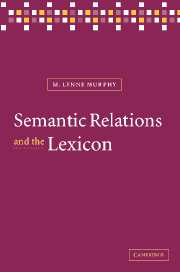Book contents
- Frontmatter
- Contents
- Acknowledgments
- Symbols and typographical conventions
- Part I Paradigmatic relations, generally
- Part II Paradigmatic relations, specifically
- 4 Synonymy and similarity
- 5 Antonymy and contrast
- 6 Hyponymy, meronymy, and other relations
- 7 Lexicon and metalexicon: implications and explorations
- Appendix: Relation elements
- Notes
- References
- Index
7 - Lexicon and metalexicon: implications and explorations
Published online by Cambridge University Press: 22 September 2009
- Frontmatter
- Contents
- Acknowledgments
- Symbols and typographical conventions
- Part I Paradigmatic relations, generally
- Part II Paradigmatic relations, specifically
- 4 Synonymy and similarity
- 5 Antonymy and contrast
- 6 Hyponymy, meronymy, and other relations
- 7 Lexicon and metalexicon: implications and explorations
- Appendix: Relation elements
- Notes
- References
- Index
Summary
There is no use indicting words, they are no shoddier than what they peddle.
Samuel Beckett, Malone Dies (1958)The previous chapters have reviewed modern thinking on paradigmatic semantic relations and proposed that such relations are metalinguistic rather than linguistic in nature. Whereas many theorists have assumed that the lexicon is organized according to relations like synonymy and antonymy, the evidence is against semantic organization of the lexicon, since meaning itself is not wholly resident in the mental linguistic faculty. This chapter returns to the assumptions put forth in chapter 1. Three questions are raised and briefly discussed: Is semantic organization of the lexicon necessary? What is a plausible model of the lexicon? And finally, if paradigmatic relations are metalinguistic in nature, what business do linguists have in studying them?
Is semantic organization of the lexicon necessary?
Throughout this book, I have argued that paradigmatic semantic relations are derived and stored metalexically, rather than intralexically. This argument has rested on the assumptions that linguistic knowledge and processes belong to a mental faculty that is separate from general cognition and that the lexicon should contain all and only idiosyncratic information that contributes to the construction of well-formed expressions in a particular language.
- Type
- Chapter
- Information
- Semantic Relations and the LexiconAntonymy, Synonymy and other Paradigms, pp. 237 - 242Publisher: Cambridge University PressPrint publication year: 2003



